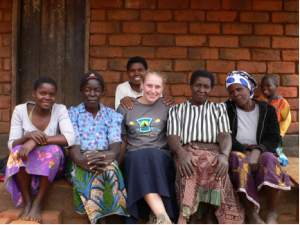
Courtesy of Emily Widra ~ Widra sits with a local potter and some of the potter’s family and neighbors.
Although not a common tourist destination, Malawi – a small, landlocked country located in southeast Africa – is one of the most important nations to the field of anthropology. As the fourth poorest nation in the world, the local economy is reliant on agriculture, and community is a very important aspect of their social culture.
Junior Emily Widra visited Malawi in the summer of 2012, after her freshman year. She participated in the three-week-long Malawi Immersion Seminar (ANT 277), which is offered every summer by UR’s Department of Anthropology.
The Malawi Immersion website describes the program as “a unique focus on experiential learning and training in the methods of field research.” Participating students travel around the country, visiting a variety of Malawian cities including the capital city of Lilongwe and rural village of Gowa.
“We had the opportunity to immerse ourselves in the culture of the country and meet a variety of people who taught us a lot about Malawi,” Widra noted.
The program does not have a traditional study abroad curriculum. Rather, it is an immersive course that involves conducting ethnographic fieldwork (field study from an anthropological or sociological perspective) as the means for each student to do research on their topic of choice.
After the program ends, each student submits an ethnographic essay on their topic, discussing what they discovered during their time in Gowa. “I chose to research the declining prevalence of pottery and potters in the local area,” Widra said. “I spent a lot of time interviewing and just spending time with the local potter [who] lived in a neighboring village… I had the opportunity to visit another community, meet people there, and learn even more from them.”
Ethnographic methods including language, interviewing and mapping skills are taught and put to use as part of the program.
Chichewa language classes are a prevalent focus of the curriculum, but not in the conventional classroom setting. During Widra’s trip, classes were held outside the hostel where they stayed in Lilogwe and students studied sitting on the ground in a local garden in Gowa.
“As a poor language-learner in school, I surprised myself with my ability to pick up Chichewa when I was fully immersed in a culture that spoke the language and when I learned [from] a local, native speaker,” Widra recounted. “The general patience everyone I spoke to had with my slightly pathetic attempts at speaking a foreign language really encouraged me and helped me become more comfortable with making mistakes and working on conversational phrases.”
In addition to language learning, students on the program spend a lot of time mapping Gowa and learning about the local economy, education system and religion “just by walking around Gowa and talking to people”. Widra spent much of her free time with her host family, “helping them with household activities like shucking the maize harvest, cooking, and selling breakfast pastries”.
Widra’s class also hiked along the escarpment on top of the Great Rift Valley where Gowa is located. “We started our hike in the afternoon and we got to see a beautiful sunset over the valley and walk through a variety of other rural villages,” she recalls.
Additionally, students also went on several two-night jeep tours in the safari at Liwonde National Park and were able to see many animals including elephants, hippos and gazelles.
Though it is offered through the anthropology department, the Malawi program isn’t just geared towards Anthropology majors. “I would highly recommend that anyone pursuing any degree [at UR] take a look at the program and consider it for next summer,” Widra said.
For her trip, Widra – herself triple majoring in Anthropology, English and Psychology – was joined by peers studying in a variety of different fields including International Relations, Business/Economics and pre-med Genetics.
“My experience was incredible,” she said. “Certainly there were things that I had to get used to – doing laundry in buckets, hyenas howling in the distance at night, different food, a difficult language – but they weren’t anything that any of the students on the trip couldn’t handle.”
Kanakam is a member of the class of 2017.


